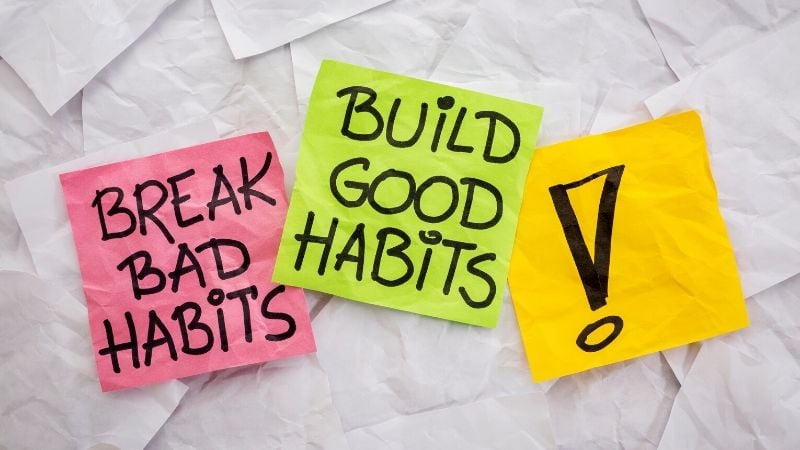December seems to be one of the most difficult months for financial goals.
Am I right?
There are holidays to pay for.
Gifts to buy.
Endless events and functions to attend.
It can test even the most conscientious savers to spend more than intended.
And that's okay.
As long as you get back on track.
Here's how.
I’m a huge fan of James Clear.
He’s an author focused on habits and decision making.
His ideas come from a wide range of disciplines, including biology, neuroscience, psychology, philosophy.
In other words, evidence.
Like us, he’s also mission-driven.
At the core is a simple, but powerful question.
How can we live better?
The insights can be applied to all areas of our lives.
Even financially.
No doubt you've slipped up in life.
We've all been there.
But as time rolls on I'm beginning to realise something important.
These small hiccups don’t make you a failure, they make you human.
The most successful people in the world slip up on their habits too.
What separates them isn't their willpower or motivation.
It's their ability to get back on track quickly.
I'm sure even Warren Buffett has made a few unsound financial decisions in the past.
Yet look where he is today!
With that said, here are seven strategies you can use to get back on track.
Get ready to make this your most successful year ever.

1. Schedule your habits into your life
Give your habits a specific space in your life. There are two main options for making this happen.
Firstly, put it in your calendar.
If you document it, chances are, you will do it.
Secondly, tie the habit to your current behaviour.
Use that behaviour to act as a reminder.
Same order, same way, every time.
Like brushing first and then flossing.
(Or vice versa depending on your preference).
I like to advise colleagues, readers and clients to make saving a habit.
As soon as your salary is paid, invest part of it.
Scheduling a debit order is the simplest way to do this.
It takes the hassle out of doing it yourself.
And possibly finding reasons to skip saving this month.
2. Stick to your schedule, even in small ways
Do you ever miss your schedule and feel like you are completely thrown off track?
For that reason, it's critical to stick to your schedule, even if it's only in a very small way.
Don't have enough time to do a full workout? Just squat.
Don't have enough time to write an article? Write a paragraph.
Can't save enough this month? Save something.
Individually, these behaviours seem pretty insignificant.
But it's not the individual impact that makes a difference.
It's the cumulative impact of always sticking to your schedule that will carry you to long–term success.
January always seems like a long month, financially.
But make sure you save even just a small amount.
Keep the routine.
3. Have someone who expects something of you
I've been on many sporting teams and you know what happens when you have friends, teammates, and coaches expecting you to be at practice?
You show up.
What happens when you've scheduled a debit order with your bank?
You pay it.
Or when you promised your children a family holiday in December?
You make sure it happens.
It's easy to delay expectations or promises when you're doing something alone.
But it's easier to stick to it when you're afraid of disappointing someone else.
It's one of the many reasons why people have financial planners.
It's not just about having someone to help explain complex ideas.
Or show the best way to invest your money.
But someone who will coach and guide you towards your goals.
And remind you of these goals when you veer off track.
4. Focus on what you can work with
We waste so much time focusing on what is withheld from us.
This is especially true after we slip up and get off track from our goals.
Anytime we don't do the things we want to do — start a business, eat healthy, go to the gym, invest — we come up with excuses…
“I don't have enough money. I don't have enough time. I don't have the right contacts. I don't have enough experience. I need to learn more. I'm not sure what to do. I feel uncomfortable and stupid.”
Here's what I want you to think instead:
“I can work with this.”
The truth is that most of us start in the same place — no money, no resources, no contacts, no experience — but some people (the winners) choose to get started anyway.
Shift your focus from what is withheld from you to what is available to you.
5. Just because it's not optimal, doesn't mean it's not beneficial
I love the saying...
“Done is better than perfect”.
It's so easy to get hung up on doing things the optimal way and end up preventing yourself from doing them at all.
Just because you can’t stick to the optimal schedule, doesn’t mean you shouldn’t stick to it at all.
Good habits are built gradually.
Start slow, live your life, and get better along the way.
Progress is a spectrum, not a specific place.
Perhaps you're a little behind on reaching your goals.
Don't let that demotivate you.
Keep going and stick to your strategy.
The result will still be as sweet.
6. Design your environment for success
Most of us acknowledge that the people who surround us influence our behaviours.
But, the items that surround us have an impact as well.
The signs you see...
The things on your desk at work...
The pictures hanging on your wall at home…
These are all pieces of your environment that can trigger you to take different actions.
I have my goals in front of me everyday.
The first thing I do when I get to work every morning...
Is open up the document and remind myself of what I'm working towards this year.
It's a great motivator.
In fact, if you want to see the template I've used for my goals, I'll gladly send it to you.
Just comment on this blog with your email address.

7. Care
It sounds so simple, but make sure the habits you're trying to stick to are actually important to you.
It’s remarkable how much time people spend chasing things they don’t really care about.
Or goals that are too big.
Impossible, even.
Then, when they don’t achieve them, they beat themselves up and feel like a failure.
You only have so much energy to put towards the next 24 hours.
Pick a habit you care about.
Like saving more this year so you can enjoy longer holidays.
Or perhaps an early retirement.
If it's really important, you'll do something every day to make it happen.
Regardless of how small those actions will be.
Could this be your best decade yet?
There's something magical about this time of year.
The energy and excitement is palpable as people are focused on improving themselves.
And their lives.
My wish for you this year is that you keep the momentum going.
And that your goals always inspire you.
If you need any help along the way...
Whether it's planning for those goals or just having someone in your corner to keep you motivated...
Happy New Decade!



